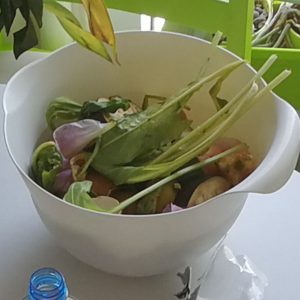022: Top Tip Thursday, Food Waste with Mariska Nell

In this episode, I will be sharing with you some more tips to reduce your food waste. In episode 21, we had zero-waste chef Max La Manna sharing some of his tips and recipes and I wanted to add to this with a few things I have learned on my journey that you might find helpful. Not only will these tips reduce your food waste but also help you save some money as you will be throwing away less food.
Episode Highlights
[01:10] One-third of all the food that is produced for human consumption is wasted. That is about 1.3 billion tons of food that is wasted annually. There are many ways how this food finds themselves among this shocking number and there are many ways how we can avoid or reduce the amount of food waste we generate.
[01:33] Give the ugly produce a go.
[01:59] Imperfect Produce is a company that collects all of these ugly fruits and vegetables from farms in the US and sell the produce at 30-50% less than what you would pay at the store. By eating this imperfect produce, you are helping to build a more sustainable effective food system as well as fighting food waste. This also allows farmers to be rewarded for their entire harvest.
[02:40] It might be a good idea to talk to some of the farmers if you do not see their ugly fruit at the market as they might not have thought about bringing them, but might in the future if they knew people are interested in purchasing them at a reduced rate.
[02:59] The food scraps do not have to end up straight into the bin. There is a lot that you can do with your food scraps.
[03:09] Potato skins I normally keep aside and fry or bake them till they are nice and crispy, sprinkle salt or your favourite spice mix and you have your very own package free crisps. These are great to top off dishes to add that little crunch factor as well.
[03:49] Ones the container is full, you can place it a pot on the stove on a medium heat, cover it with boiling water and let it simmer for at least 30 minutes. Strain the vegetables until you are left with a beautiful stock, make sure you squeeze every last bit of stock out of the vegetables. You can then use the stock by keeping it in the fridge for up to 3 days or freezing it in your ice tray and using the little cubes when you require the stock. These can be frozen for up to 3 months.
[04:24] The leftover vegetables can then be composted.
[04:48] Reduce the amount of animal products you use.
[05:18] Maybe try to reduce the amount of meat that you use in your dishes. For example, you would be able to add more vegetables to your spaghetti Bolognese.
[05:50] Meatless Mondays or the odd day meat day.
[06:37] The amount of delicious vegetarian and vegan food is increasing in restaurants and grocery stores. This will make sure that you do not have to chew on a boring salad on those days and to give you some inspiration I have linked up a few great recipes from Max La Manna for you to try as well.
[07:00] Reduce the amount of food you dish up.
[07:40] I always have a beeswax wrap or lunchbox with me and in the case that I do have any leftovers, I would be able to place it in the container or wrap it in the beeswax wrap and take it home with you to enjoy later.
Key Take Away
“One-third of all the food that is produced for human consumption is wasted. That is about 1.3 billion tons of food that is wasted annually.”
1.3 billion tons is a very high number of food waste and if we think of the number of people around the world that is starving it is even more shocking. There are many ways how we would be able to reduce the amount of waste that we as individuals produce. In reducing our food waste we might adopt new habits, like purchasing only what we need and therefore would have less food that would be able to go bad if we can not eat it in time. This is not only good for Mama Earth but for our wallets as well as by reducing the amount of food we throw out, we would reduce the amount of money that we spend when only purchasing what we require. It might only be a small step for us but if more people start doing it, can start a ripple of change.

